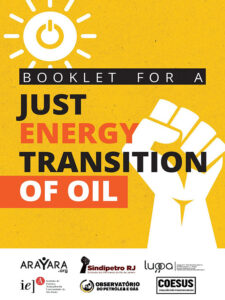 Livro: BOOKLET ENERGY TRANSITION OF OIL
Livro: BOOKLET ENERGY TRANSITION OF OIL
Autor: Organização Arayara
PRESENTATION
Power generation accounts for 73.2% of all greenhouse gases (GHG) artifi cially emitted into our atmosphere. This is because 78% of all energy demand in the world today is supplied by fossil fuels. In the internal energy supply in Brazil, the generation by fossil fuels is 53.3%. Despite this, the year 2021 was marked by a 24% increase in thermoelectric generation in relation to the previous year. The highlight was the growth of natural gas, oil derivatives and coal, to the detriment of hydroelectric generation, a result of a strong hydroelectric crisis in the country. Putting Brazil against the IPCC guidelines of reducing up to 45% of GHG emissions by 2030, and international commitments, such as the Paris Agreement (2015) and COP 26 (2022). Based on the understanding that the energy sector has an essential role in these commitments, but that the discussion should be extended to various sectors of society, a working group was formed to think about a just energy transition, its guiding principles, and possible paths. The working group is formed by the articulation between academia, the oil workers’ union and the third sector, and comprises the following groups: Arayara International Institute, facilitator of the working group, has been operating for 30 years promoting social change through environmental education and political activism in the search for more effi cient use of energy matrices and broad land rights in all regions of Brazil; League for the Universalization of Participation in Public Environmental Policies (LUPPA), an initiative of students from the Federal University of Rio de Janeiro which since 2019 produces studies, widely disseminating the environmental agenda topics, seeking to strengthen the democratic spaces of decision and facilitate the action of the population; The Institute for Advanced Studies (IEA) at the University of São Paulo (USP) is an integrating entity aimed at researching and discussing, in a comprehensive and interdisciplinary way, fundamental science and culture issues. To this end, it is integrated by different research and study groups, such as the USP Global Cities Synthesis Centre, part of this working group, dedicated to urban sustainability issues; The Oil Workers’ Union of Rio de Janeiro (Sindipetro-RJ) is dedicated to the defence and representation of workers of industry and transport of oil, gas, raw materials, derivatives, petrochemicals and related, biomass energy and other renewable and alternative fuels, seeking improvements in living and working conditions of its members. The guiding principles presented in this document aims to sensitize and raise awareness among governments and public policy makers, the press, Petrobras workers, other international unions, and other peripheral countries. The methodology for the construction of this document comprised a survey of the bibliography on Just Energy Transition and case studies, discussions with the groups involved, and the creation and congregation of principles. And fi – nally, the systematisation of consultations carried out with other groups representing traditional communities, people affected by impacts, workers, and companies in the energy sector, allowed for better qualifi cation in the defi nition of principles, with a broader perspective of society.
